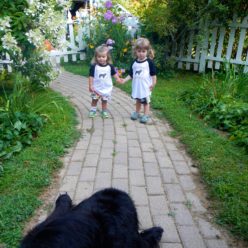
"I don't read books," a young Carroll colleague recently told me as a second colleague nodded his head in agreement. "I just don't have the time for pleasure reading or for reading outside my discipline if I am also to keep up with my research agenda and stay abreast of the psychological literature. When I read I do it online."
Perhaps this is yet another signal that I am becoming a stranger in a strange land. Walk into my office and you'll see books lining the walls, stacked on the floor, on my desk, and piled on the chairs around my desk. Novels, short stories, poetry, and nonfiction—paperback and hardback, pages stained with coffee, annotated, or dog-eared and occasionally, dog-drooled upon. Follow me home to my study and you'll find more of the same! Books and the many authors who write so much better than I and who think in such
different ways than I have clearly shaped who I am and who I aspire to be. I am book-marked!
I love to read! Thank you first-grade teachers past, present, and future for engendering a love of reading in children. I especially enjoy reading books or articles outside the narrow confines of my academic specialization and by authors from different cultures. Though I own a Kindle, it lies in a drawer umplugged and gathering dust.Though I have on my computers applications that allow for reading ebooks, I find the act of reading on a computer an entirely different (and
less pleasurable) experience than reading print on paper. Though I have attempted to listen to audio books, I fail to be transformed by them in the same way as when I read the presentation.
Two recent psychology-related books which I read this summer are Richard J. Davidson (with Sharon Begley)'s The Emotional Life of Your Brain and Cathy Davidson's Now You See It: How the Brain Science of Attention Will Transform the Way We Live, Work, and Learn. Both are autobiographical in explaining the foundation of their research efforts.
R. Davidson (who was named by Time Magazine in 2006 as one of the 100 most inflential people in the world) makes a compelling case for the neurological stucture of six dimensions of emotional style:
- resilience (how quickly one recovers from emotions)
- outlook (how long one can sustain positive emotion)
- social intuition
- self-awareness
- sensitivity to context
- and attention (focus)
He suggests ways to measure and to change one's emotional style.
C. Davidson (of whom I first became aware because of her "This Is Your Brain on the Internet" course fame) provides a rambling, provocative, anecdotal and inspirational book which asserts that there is a mismatch between work and the ever-changing workplace and which shares her evolving thoughts about 21rst century literacy. She is scheduled to give a presentation and lead a faculty workshop at Carroll on October 8, 2012.
Most of my summer reading was fiction, however. What suggestions do you have for me to read next?
